Church

Last week I was a little under the weather, so when my husband and kids took off after church for a hike, I headed to the YMCA. It’s only a two minute drive from our house and we’ve been members for nearly 5 years now.
As I sat in the hot tub, watching folks come and go, I had the sensation of being in a thin space. According to Celtic tradition, a thin place is when Heaven & Earth feel particularly close together. Or, as Eric Weiner put it in his New York Times travel article a couple years ago, it’s "where the distance between heaven and earth collapses and we’re able to catch glimpses of the divine, or the transcendent."
The YMCA might seem a strange place to behold the holiness of God, but this is what I noticed while I was sitting quietly with the water swirling around my feet:
I heard Mandarin, Spanish, Korean and what I think was Amharic. I heard English, too, of course, and for a brief moment, English with a heavy Nigerian accent. I saw brown skin and black skin, tan skin, white skin, splotchy skin, and smooth skin.
I saw a young girl and her mama soaking together in the hot tub, the mom still fully clothed with her head wrapped. I saw heavily tatooed 20-somethings heading for the steam room. I saw three women, probably in their seventies, with drooping skin and sagging suits, laughing uproariously on the benches near the shallow end of the pool. I saw fat folks, skinny folks, tall folks and short folks.
I saw a middle-aged man limp slowly along and finally sink down into the hot tub. I saw two women walking arm in arm, one obviously leading the other who could not see, to the sauna. I saw two of the lifeguards re-positioning and working with tools on the lift that lowers those who are wheel-chair bound down into pool if they are unable to get in on their own. There was a man sitting beside me at who talked to himself at length.
I was there for about an hour and as I sensed the nearness of God in that space, it occurred to me what I was seeing — I was seeing the Kingdom of God.

If you’re dismayed that one in five Americans (20 percent) are “nones” — people who claim no particular religious identity — brace yourself.
How does 38 percent sound?
That’s what religion researcher David Kinnaman calculates when he adds “the unchurched, the never-churched and the skeptics” to the nones.
He calls his new category “churchless,” the same title Kinnaman has given his new book. By his count, roughly four in 10 people living in the continental United States are actually “post-Christian” and “essentially secular in belief and practice.”
If asked, the “churchless” would likely check the “Christian” box on a survey, even though they may not have darkened the door of a church in years.
Kinnaman, president of the California-based Barna Group, slides them into this new category based on 15 measures of identity, belief and practice in more than 23,000 interviews in 20 surveys.
The research looked at church worship attendance and participation, views about the Bible, God and Jesus, and more to see whether folks were actually tied to Christian life in a meaningful way or tied more by habit or personal history.
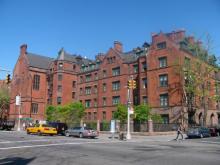
News articles about turmoil at General Theological Seminary had immediate impact on those of us who attended Episcopal seminaries.
But the news “went viral” far beyond that small coterie and for reasons beyond nostalgia.
For one thing, it’s a juicy soap opera. Faculty playing hardball, then finding themselves unemployed. A dean pushing back, then losing credibility as word about him spread. A board looking confused and high-handed. Students wondering if they, too, should go on strike.
But impact goes beyond the particular event itself. For something fundamental seems to be changing.
THE CRY OF the church to the world should be “Forgive us.”
At a time when the American church struggles with finding its place in the world and struggles with asserting its identity, could the church be known as the community that models confession, repentance, and the seeking of forgiveness? At this moment in history, the American church is often ridiculed or portrayed as unforgiving and ungracious. Could the church offer a counter-narrative, not of defensiveness or derision but of an authentic confession and genuine reconciliation? By examining seven different areas where the church has committed sin, we ask the church to consider the spiritual power and the theological integrity of a church that seeks forgiveness for those sins.
Our scriptures testify to the necessity of confession. Confession is central to the Christian faith. The importance of confession arises from the Christian view of sin. Sin is a reality and must be taken seriously. Evangelicals consistently begin our gospel presentation with the centrality of sin to the human experience. American evangelicals often assert that the beginning of the work of God’s forgiveness is the recognition of our need for God because of human sinfulness.
It is antithetical to the gospel when we do not confess all forms of sin—both individual and corporate. The reason evangelicals can claim to be followers of Jesus is because there has been an acknowledgement of sin and the seeking of God’s grace through Jesus Christ that leads to the forgiveness of sin.



By now you have heard that Apple gave you music. Free music. From U2. Now, they paid U2 a lot of money for those tunes and it's pretty clear that it's not the first time that someone paid a U2 a lot of money for their music so that you could have it for free as long as you were a loyal customer.
The U2 back catalogue has done pretty well this week.
Some of us are rather peevish customers, it would seem. There have been numerous articles on the betrayal by either U2 or Apple. Don't they know that our iDevices are private property? Don't they know that we have put a fence around our little corner of the cloud?
Sadly the tech doesn't really work that way and the agreement you checked - we all checked, really - makes it pretty clear that they own the cloud and you merely lease space there. Your iDevice is a portal, no more, no less.

Church leaders often worry that Sunday morning is the “most segregated day of the week.”
On Sundays, churchgoers gather inside congregations that are remarkably monochromatic. Whites with whites, blacks with blacks, Latinos with Latinos, Koreans with Koreans, and so on.
This phenomenon, however, is more than discomfort with diversity. It is also a search for safety. In the historic black church, for example, worshippers can assert the dignity and worth that a white society denies them. For three hours on Sunday, the need to avoid offending whites doesn’t govern their lives.
As we are learning in Ferguson, Mo., African-Americans feel unsafe — far more than many whites have realized. Young black men, for example, flinch whenever a police car passes — a vulnerability that money, job, and education can’t overcome.

According to one of my favorite authors, Brennan Manning, "The single greatest cause of atheism in the world today is Christians, who acknowledge Jesus with their lips, then walk out the door and deny Him by their lifestyle. That is what an unbelieving world simply finds unbelievable." It is just a much more eloquent way of saying that the world thinks we’re a bunch of hypocrites.
To be quite honest, most of the time, the claim is warranted. I have a friend who wants nothing to do with Jesus because his father, a very religious man, was active in the local church but was abusive behind closed doors. Another friend continues to distance herself from anyone associated with the church because of their judgmental glares about her lifestyle choices.
Whatever their reasoning, I understand. I, too, have personally encountered the hypocrisy they see in our communities of faith. And if I'm at all honest, the number of times I have been the hypocrite who has turned others away are too numerous to count.

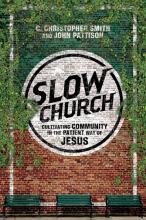
HERE’S WHAT Slow Church is not: A how-to manual with five easy steps to make your congregation more thoughtful. A celebration of how using the word “community” often on your church website will multiply your pledge and attendance numbers. An ode to really, really long worship services.
Rather, Slow Church explores being church in a way that emphasizes deep engagement in local people and places, quality over quantity, and in all things taking the long view—understanding individuals and congregations as participants in the unfolding drama of all creation. Authors C. Christopher Smith and John Pattison are self-proclaimed “amateurs,” insofar as they are writers-editors and lay leaders, not professional pastors, theologians, or congregational consultants. But this book is richly informed by their experience in their own church contexts (Englewood Christian Church in a gritty neighborhood in Indianapolis for Smith; an evangelical Quaker meeting in small-town Oregon for Pattison), conversations with other church communities, and close reading of classic and contemporary literature on culture, Christian community, scripture, and spirituality

If Christians stopped bickering about church, presenting sex as a first-order concern, telling other people how to lead their lives, and lending our name to minor-league politicians, what would we have to say?
We need to figure that out, because we are wearing out our welcome as tax-avoiding, sex-obsessed moral scolds and amateur politicians.
In fact, I think we are getting tired of ourselves. Who wants to devote life and loyalty to a religion that debates trifles and bullies the outsider?
So what would we say and do? No one thing, of course, because we are an extraordinarily diverse assembly of believers. But I think there are a few common words we would say.
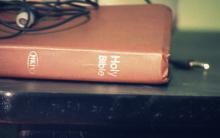
Christians ultimately attend church to meet with God. But sometimes we turn our churches into distractions, and spiritual leaders mistakenly prioritize things beyond God, becoming obsessed with marketing, consumerism, and entertainment — creating false idols.
The diluting of church happens in both subtle and obvious ways:
Scripture is substituted for a stirring YouTube video.
Worship is tweaked to incorporate flashing lights, fog machines, and synchronized graphics.
Visitors are given nicer gift baskets.
Contests are held. Websites are updated. Social media is expanded. Apps are developed. Promotional clothing is given away — a brand is created.

My sister has one of those plastic playhouses in her backyard for her two boys. When she hosted a garage sale a few years ago, children accompanying their shopping parents would see the playhouse and join in.
I remember looking over at one point and seeing five children playing together. Different ages, different sexes, different races. All strangers. All playing together.
When they looked at each other, they saw a playmate.
In his autobiography, Nelson Mandela noted that children have an innate openness that tends to get closed off as they spend more time in the world.
“No one is born hating another person because of the colour of his skin, or his background, or his religion,” Mandela wrote in his autobiography. “People must learn to hate, and if they can learn to hate, they can be taught to love, for love comes more naturally to the human heart than its opposite.”
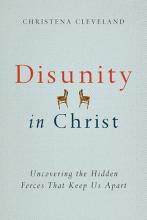
OVER THE PAST 2,000 years, Christians have found myriad ways to divide the body of Christ. We are now more divided than ever, with more than 40,000 Christian denominations worldwide. Perhaps, in this context, we are asking the wrong questions. Do we really understand God’s desire for the church to be one? Do we as individuals have a yearning for the unification of the body of Christ? Why do we create the divisions we create? Why do we maintain the divisions that already exist? How can we break through these barriers to heal a broken church?
Christena Cleveland sets out to answer all of these questions and more in her latest book, Disunity in Christ. Cleveland is a young, energetic, and brilliant teacher, speaker, and researcher in the fields of social psychology and faith and reconciliation. For those concerned with reconciliation in the church, which should be all of us, hers is a voice to take seriously.
In Disunity, Cleveland quickly breaks the ice by poking fun at herself and by pointing to her own personal prejudices and biases that have led to her categorically labeling fellow brothers and sisters in Christ as either a “right Christian” or “wrong Christian.” The reader is immediately able to connect with her and realize the ways in which we have created division in our own lives, whether because of race, gender, orientation, education, location, socio-economic status, theology, or political affiliation. It also becomes apparent why we prefer our homogenous groups.

SINCE HIS ELECTION as the 265th successor of St. Peter, Pope Francis has provided a refresher course on Catholic social teaching to the world’s 1.2 billion Catholics. “Catholic social teaching is no longer a secret,” says Jean Hill, director of peace and justice for the diocese of Salt Lake City. “Everything Pope Francis is saying comes from social doctrine and is about social justice.”
Through his various homilies, speeches, and meetings, Francis is “reading the signs of the times” and making practical application to the issues of the day. Some of his most powerful statements to date were made in his first pastoral document, “The Joy of the Gospel,” including this declaration: “I prefer a church which is bruised, hurting, and dirty because it has been out on the streets, rather than a church that is unhealthy from being confined and from clinging to its own security.”
Pope Francis is calling the faithful to be more merciful, compassionate, joyful, and centered upon the needs of the poor and vulnerable. He wants a church that sees the human person before the law and one that does not “obsess” about a narrow set of issues, but affirms both human life and human dignity. He invites Catholics to pray, reflect, and embrace the beauty and breadth of Catholic social teaching—a rich tradition that is predicated on the dignity of the human person.
The United States Conference of Catholic Bishops (USCCB) defines Catholic social teaching as “a central and essential element of our faith. Its roots are in the Hebrew prophets who announced God’s special love for the poor and called God’s people to a covenant of love and justice.” This teaching is also founded on the life and words of Jesus. It posits that “every human being is created in the image of God and redeemed by Jesus Christ, and therefore is invaluable and worthy of respect as a member of the human family.”

Anyone who thinks much on theology will tell you that you go through patterns of thought. For a long time, I was intrigued — and still am in many ways — by the notion of Jesus as a “third way” prophet, offering something different than both church and secular culture most of the time. As I learned of different interpretations of the crucifixion, I became obsessed with nonviolent activism, and the idea of responding to force or bloodshed with something else entirely.
Now, my latest mental track is sacrament. I am interested in what makes something a sacrament, yes, but also in the power connected to sacraments and what human beings do with that power.
I am part of the Christian Church (Disciples of Christ), a denomination that has Alexander Campbell as part of its roots. Campell was notorious for supposedly causing a stir in his local church around the sacrament of communion. At that time, the Church handed out tokens to those it deemed worthy to participate in communion. No token? No communion. So this one particular day, Campbell entered the church with his token in hand, but when they offered the elements to him, he refused, tossing the token on the ground and walking out. He went on to help start the Disciples based, in large part, on the concept of the open communion table.

It’s interesting how we tend to think of birth and death as opposites, two bookends with life in the middle. But we also know from experience that birth and death really are two different words for the same thing. They involve change, a moving from one phase of life to another.
Birth and death and rebirth are parts of the very fabric of life.
This moment, countless cells inside our bodies are dying and being replaced by new ones just like them. New ideas are being hatched in our heads, replacing old ones. Stars throughout the universe are using up their final fuel and imploding, sowing seeds for rebirth throughout the universe.
All around us and within us, there’s a constant birth and death and newness.
It’s what life is about.
The same is true of our human institutions. Whether they’ll acknowledge it or not, they’re constantly going through the birth-and-death-and-rebirth cycle. It’s certainly that way with our religions and our churches.

To a Dying Church,
Guess what? It’s not that bad.
You just have to get it together a bit.
Seriously, like yesterday. I mean, we have time. But, seriously, we’re all waiting for you to get it together.
You have the means. You have the ability. You have the know-how.
Actually, you don’t have to do that much. You just have to realize that Jesus has done it all and there is a current of immense possibility right under your feet.
Tap into it. Remember it. Root down.
This happens every so often. We are cyclical people. Every once in a while we forget.
But this time you’ve really done a doozy on your own health by chasing after insane supplements and growth hormones. And you’ve also picked some really lame fights. In the race to grow you’ve forgotten your way a bit and now you’re bloated and punch-drunk in the streets swinging at anyone that’ll ask a sensible question.
Stop it. You’re better than this.
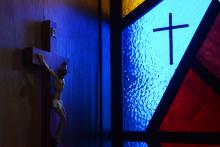
To the dying church,
I think I missed the moment. It was a pretty big moment, too. At least here in the United States, you were a force to be reckoned with until a few years ago. You helped form the fabric of our society. Pastors were well-respected people of authority. They built great big sanctuaries, and people wore respectable clothing on Sunday mornings. To be fair, you didn’t — and don’t now — always live up to the hype. Sometimes you hide your head in the ground when it’s time to stand up against racism and homophobia. You’re still not so sure about the equality of women. You sometimes sell out to political agendas.
But regardless of the good and the bad, the moment is now over, and you’re dying. Or that’s what they tell me. All that power and influence is fading away. It sounds like some churches are having trouble even keeping the lights on. I know I should mourn for you, but allow me a moment of self-pity here too. What, you thought it was all about you?
You see, I’ve been getting ready for a few years now. A bunch of us have. Some of us have grown up with you, and some of us have just met you recently, but we’re all lining up to serve you. Somehow we all have this nagging sense that we’re supposed to be with you in these days, so some of us went to seminary and some went to college to learn youth ministry. We went to conferences and gave up our evenings and weekends to church basements with committees and youth groups. We read books and studied Scripture and prayed and imagined the kingdom of God breaking into the world through you. They call us emerging leaders, and we had a lot of hopes for you.